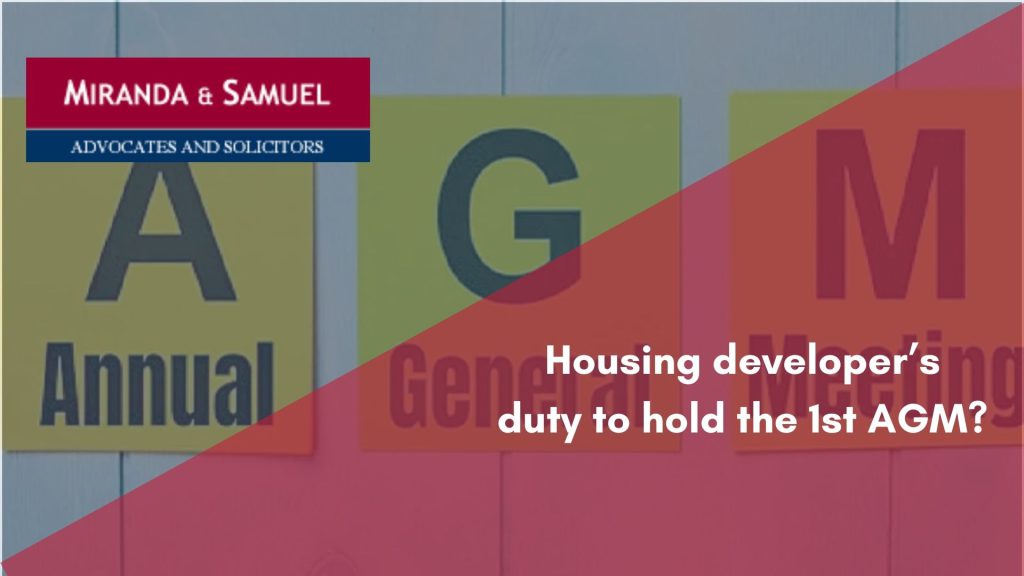Recently, the joint management body (‘JMB’) of Royal Strand & Loveall condominium lodged a police report against its housing developer, Country Garden Danga Bay Sdn Bhd alleging that an Annual General Meeting (‘AGM’) held on 2 July 2023 is unlawful as the minimum 14-day notice period was not adhered to.
The developer denied this and stated that due notice on the AGM had been sent to the owners of the property by registered post at least 14 days before the date of the AGM pursuant to the law. A copy of the notice was also displayed on the announcement board in the common area of the condominium. The developer further alleged that it was important to call for the AGM as the 15-month period had lapsed but to date, the JMB had not called for the AGM for the year 2022 despite a consent award had been imposed by the Strata Management Tribunal on the JMB to convene the AGM before April 2023.
The housing developer’s duty to convene AGMs is governed by the Strata Management Act 2013 [Act 757], Strata Management (Maintenance & Management) Regulations 2015 and Strata Titles Act 1985. These acts are enacted to provide for the proper maintenance and management of buildings and common property and related matters.
–
–
Developer’s duty to convene the first AGM
According to Section 17(1) and 18 of the Strata Management Act 2013 (‘SMA 2013’), it is the developer’s duty to convene the first AGM of the JMB within twelve (12) months from the date of delivery of vacant possession of a parcel to a purchaser .
It is important to give written notice of the 1st AGM to all the owners not less than 14 days before the meeting. Also, the said notice must be displayed at a conspicuous part of the development area, for example, the announcement board in front of the lift lobby. Failure to comply would result in the developer being guilty of an offence and be liable to a fine not exceeding RM250,000.00 or imprisonment for three years or both.
Before the 1st AGM, the developer shall prepare and place for consideration an annual budget that sets out the expected and estimated expenditure required to properly maintain and manage the buildings or lands and the common property of the development area starting on the first day of the month following the date of the 1stAGM.
The 1st AGM of the JMB is important in order to decide the management and the maintenance of the building and under Section 19 of the SMA 2013, the agenda for the 1st meeting should include the following matters:
(a) determine the number of members of the joint management committee (‘JMC’) and to elect the members of the JMC
(b) consider the annual budget prepared by the developer to maintain and manage the building;
(c) determine the amount to be paid by a parcel owner as the Charges and contribution to the sinking fund;
(d) determine the rate of interest payable by a parcel owner in the event of any late payment of the Charges or contribution to the sinking fund;
(e) consider the audited accounts during developer’s management period;
(f) confirm the taking over by the JMB of insurances effected by the developer under this Act;
(g) make additional by-laws; and
(h) consider any other matter related to the maintenance and management of the common property of the building or land.
Thus, the developers must ensure that the 1st AGM of JMB and the establishment of the JMB are done properly in accordance with these provisions.
Whereas in a situation where the vacant possession of the property is delivered by the housing developer to the purchasers and the Management Corporation is established upon the opening for registration of strata title, the developer is required to convene the 1st AGM of the Management Corporation within one monthafter the expiration of the “initial period” (Section 57 of the SMA 2013).
The initial period as interpreted by Section 46 means “the period commencing on the day on which the management corporation comes into existence and ending on the day on which there are proprietors, excluding the original proprietor of the lot of land or the developer who is registered as the proprietor of a parcel or parcels or a provisional block or blocks, the sum of whose share units is at least one-quarter of the aggregate share units.”
As for the 1st AGM of the JMB, the developer is also required to give written notice of the 1st AGM to all the owners not less than 14 days before the meeting and the said notice must be displayed at a conspicuous part of the development area.
Similarly, before the 1st AGM, the developer shall prepare and place for consideration an annual budget that sets out the expected and estimated expenditure required to properly maintain and manage the buildings or lands and the common property of the development area starting on the first day of the month following the date of the 1st AGM. The agenda for the 1st meeting of the Management Corporation should also include the following matters:
(a) determine the number of members of the joint management committee (‘JMC’) and to elect the members of the JMC;
(b) consider the annual budget prepared by the developer to maintain and manage the building;
(c) determine the amount to be paid by a parcel owner as the Charges and contribution to the sinking fund;
(d) determine the rate of interest payable by a parcel owner in the event of any late payment of the Charges or contribution to the sinking fund;
(e) consider the audited accounts during developer’s management period;
(f) confirm the taking over by the JMB of insurances effected by the developer under this Act;
(g) make additional by-laws; and
(h) consider any other matter related to the maintenance and management of the common property of the building or land.
A developer that fails to convene the 1st AGM of the Management Corporation would be committing an offence and shall be liable to a fine not exceeding RM250,000.00 or imprisonment not more than 3 years or both upon conviction.
–
By George Miranda , Joy Sam Jia Qian, Kong Chai Yin
–
This article is for general information purposes only and does not constitute legal or professional advice. It should not be used as a substitute for legal advice relating to your particular circumstances. Please note that the law may have changed since the date of this article.




